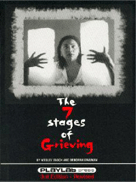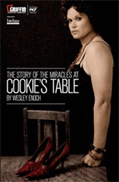Wesley Enoch – January 17 2016
 Wesley is a proud Noonuccal Nuugi man originally from Stradbroke Island (Minjeribah). He has worked with all of Australia’s major theatre companies and his work has been staged in all major festivals of the country and regularly tours overseas. Wesley is a well known writer and cultural leader, a member of a number of industry boards and committees including the Creative Australia Advisory Group, Ethics Council (National Congress of Australia’s First People) and a Trustee of the Sydney Opera House. In 2010, he was appointed the Artistic Director of the Queensland Theatre Company. Wesley’s other plays include Black Medea and Black Diggers (developed with Tom Wright).
Wesley is a proud Noonuccal Nuugi man originally from Stradbroke Island (Minjeribah). He has worked with all of Australia’s major theatre companies and his work has been staged in all major festivals of the country and regularly tours overseas. Wesley is a well known writer and cultural leader, a member of a number of industry boards and committees including the Creative Australia Advisory Group, Ethics Council (National Congress of Australia’s First People) and a Trustee of the Sydney Opera House. In 2010, he was appointed the Artistic Director of the Queensland Theatre Company. Wesley’s other plays include Black Medea and Black Diggers (developed with Tom Wright).
 The 7 Stages of Grieving (co-written with Deborah Mailman)
The 7 Stages of Grieving (co-written with Deborah Mailman)
Playlab, 2002; ISBN 0908156537
60 minutes; 1-2 cast members
This is a contemporary Indigenous performance text from the highly acclaimed Kooemba Jdarra. Appropriating western forms whilst using traditional storytelling, it gives emotional insight into Murri life. This one-woman show follows the journey of an Aboriginal ‘Everywoman’ as she tells poignant and humorous stories of grief and reconciliation. A powerful, demanding and culturally profound text, The 7 Stages of Grieving is a celebration of Indigenous survival, an invitation to grieve publicly, a time to exorcize pain. It has a universal theme told through the personal experiences of one incredible character.
 The Story of the Miracles at Cookie’s Table
The Story of the Miracles at Cookie’s Table
Currency Press, 2005; ISBN 9780868198033
90 minutes; 2 female, 2 male
‘Let this table be a home for me. Let it be a home for all the lost and the hungry. May all my children and my children’s children eat at this table.’
In the 1870s a girl is born under a tree – her birth tree – chosen to give her strength and wisdom. When the tree is cut down she follows it into the white man’s world, working as a cook for the big house on the island. Her tree has become a kitchen table, one she will pass down through successive generations as a legacy— a way of carving out her family stories. Now, generations later, a young man and his mother fight for ownership of the table. This is a moving testament to culture lived, lost and found, the strength of family, adapting and gathering together.
